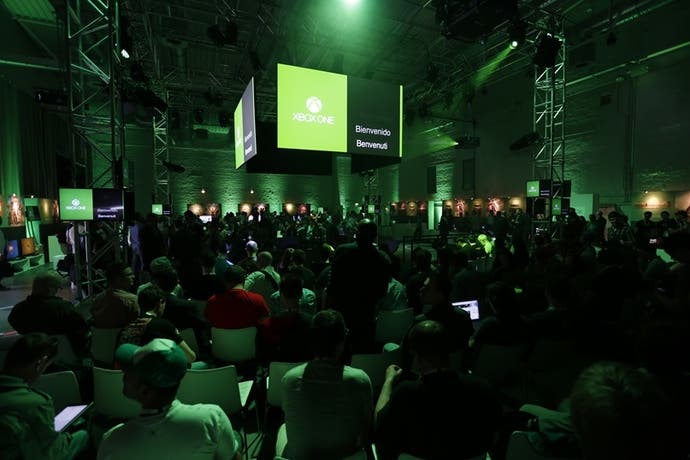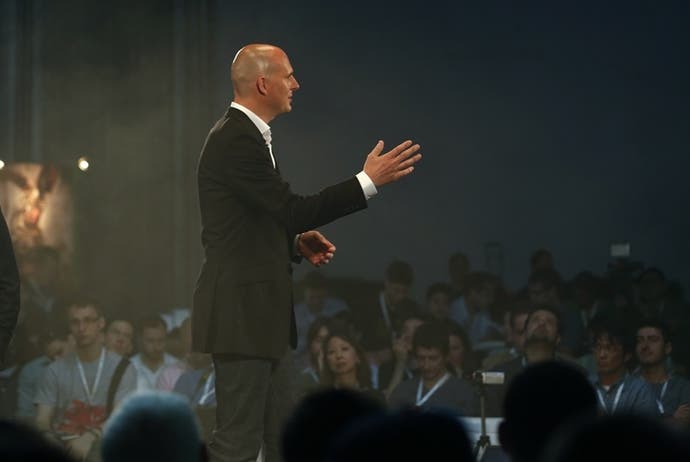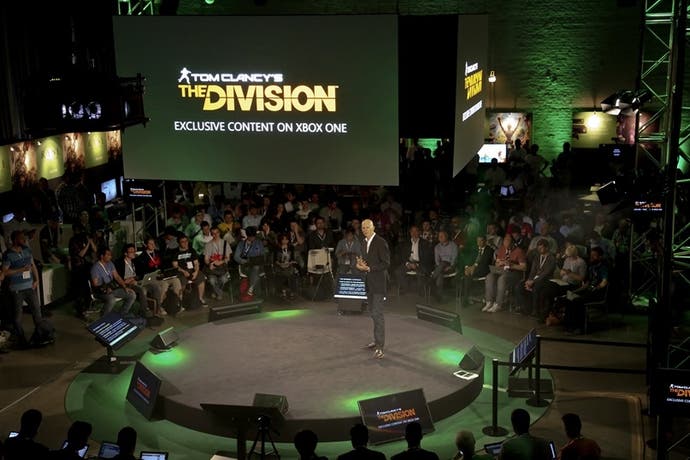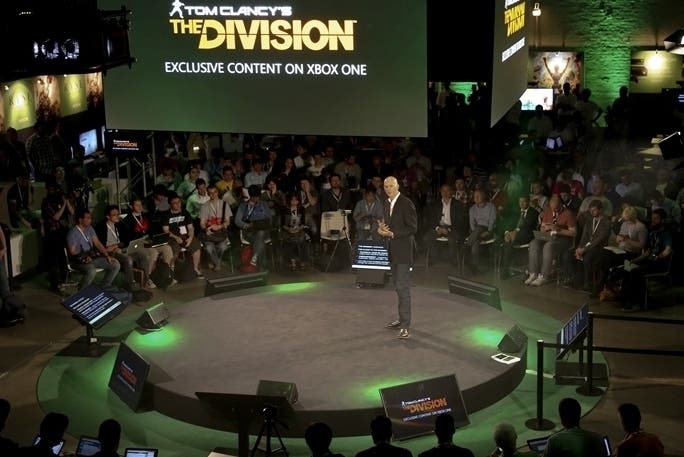Whisper it, but Xbox One is finding its stride
I still won't buy one for now, but I reckon a lot of people will.
I guess it's no secret that I didn't like the original Xbox One pitch. I appreciate the convenience of digital marketplaces and I play a lot of online games, but it was naive to expect people to swallow an always-online console with licence-only ownership without offering any tangible justification for making those changes. I felt Microsoft was pushing us towards those things not because it found compelling arguments in game design, but because it found compelling arguments on its corporate roadmap.
A lot has changed in three months. Disc-based games are back, enabling a traditional second-hand market, while the console can also operate without the internet - at least once you download a day-one patch that tells it to do so. Other changes have been made too - Kinect no longer has to be plugged in, a bone of contention that wasn't helped by Microsoft's involvement in PRISM, a headset is going into the box, and on Tuesday we learned that Europeans who pre-order get a free game: FIFA 14.
Microsoft also argued this week that its launch line-up is one of the strongest for any console ever. I am not convinced it's the strongest for any Xbox ever, let alone console - the first Xbox had Halo and Project Gotham Racing, after all - but it certainly compares favourably to PlayStation 4's offering. Crimson Dragon, Dead Rising 3, Fighter Within, Forza Motorsport 5, Killer Instinct, Lococycle, Ryse - I doubt any of them is going to redefine anything, but they're all exclusive, and some of them are bound to be good. With multiformat games like Watch Dogs due out in parallel, there's a lot to choose from.
"Microsoft seems to have made it out of panic mode and onto more of a console war footing."

I recognise that this is not going to be a popular view, but I'm also pleased that Microsoft has stood firm on keeping Kinect in every box. I've been a vocal critic of the first Kinect, which was sold on promises the hardware could not keep, but I've used Kinect 2.0 and it's a substantial improvement. One of my concerns about next-gen systems is that they lack any killer new hardware features besides more power, but a Kinect sensor that finally achieves its original potential could be a game-changer if Microsoft can find the right software for it. That's a big 'if', but console makers should take risks with their hardware vision, and this is a better kind of risk to take than dropkicking us into a digital-only future.
After the dark days of #XboxTent, then, not to mention the mixed messages of E3, the infamous policy climbdown and Don Mattrick's departure (may he rest in peace), things are looking a little brighter for Xbox One. Executives still sound embattled in interviews and Sony's crowd-pleasing Gamescom conference won the latest social media battle, but the company seems to have made it out of panic mode and onto more of a console war footing.
This is particularly evident in its public announcements. One of Microsoft's tactics in the last console war was tying up little exclusive deals that gave people just enough reason to choose an Xbox over a PlayStation, and it's at it again this time. Having already announced that Call of Duty DLC will debut on Xbox, this month we learned that COD will have dedicated servers for Xbox One, while the other forthcoming biggest-game-in-the-world, FIFA 14, will have slightly more Ultimate Team content available on Xbox, and this week we got to hear what it is - just as excitement about the new football season really gets going. Meanwhile, The Division isn't even out until Christmas 2014, but it was a big hit at E3, so here's a DLC deal.
Core gamers may have poured scorn on some of this stuff - I'm a big FIFA Ultimate Team fan, for example, and I'm not that bothered about a bunch of rare players that will be stupidly overpriced on the auction house and probably show up on PlayStation six months later anyway - but it will have a cumulative nudging effect on a lot of undecided gamers outside of the bubble we occupy, and will probably have more of an impact on people within it than many of us would like to admit. I wonder how many who were saluting Sony's indie exclusives are privately torn about whether they can put up with missing out on COD DLC for a month every time.

In a way, this is Microsoft back in its comfort zone. The company always looked awkward going into this generation as ipso-facto market leader - a position it has a history of screwing up when it has attained it in other businesses, most famously with Internet Explorer - but it likes trying to chase down a competitor. ID@Xbox may be late to the party, for example, but if there is financial and cultural capital playing catch-up on indie games then Microsoft will renew its efforts to do so.
So has the last three months changed my mind about Xbox One? Sort of.
For me, the underlying motivation that led to the original Xbox One policies is still there. Just yesterday Phil Spencer said the digital ecosystem "remains a core philosophy", and I expect the console to head in that direction again once it becomes more established. That direction isn't for me if it's to the exclusion of all else - the console gaming login I choose now will be the one I am most bound by over the next 5-10 years, so I am going to pick one that gives me the most choice and the most confidence that those choices will remain available for a long time.
However, the recent changes to Xbox One have elevated it from something I genuinely didn't want in my house to something I will probably pick up as soon as there's a desirable game that I can't experience anywhere else, even though, as far as it fits into my life, it's going to be this generation's second platform.
"I suspect Xbox One is going to be a lot of people's primary platform after all."
The main difference between now and three months ago, though, is that I suspect Xbox One is going to be a lot of people's primary platform after all. More so now than in any previous generation, we will all make this decision in groups, buying the same system as each other because we want to play together, and this feeds into Microsoft's strategy really well, because a group will favour a cross-section of everyone's preferences. With the old policies now less of an issue, if everyone is slightly nudged towards Xbox One by a different marginal exclusive that appeals directly to them, the group decision may swing more easily in Microsoft's favour.

It may even overcome the price difference between PS4 and Xbox One - a not insubstantial £80 - which will be the last big stumbling block for a lot of people, and which makes it harder to get on board with the inclusion of Kinect. If Microsoft could do something about the price without sacrificing Kinect, that would make things very interesting, although this week's FIFA announcement suggests it hopes to soften the blow in other ways.
Meanwhile, Sony is sticking firmly to its message about supercharged PC hardware driving creativity and freedom of expression from the smallest studio to the largest corporation. It's a good message, but it is starting to feel too broad for this late stage in the pre-launch cycle. Adverts during X Factor aren't going to talk about N++ and Everybody's Gone to the Rapture, after all; they're going to talk about Killzone: Shadow Fall and DriveClub. If the other side is pitching Call of Duty DLC first and Forza Motorsport 5, things may be closer than they appear.
"Others have shifted their message and changed their story," Andrew House zinged during Sony's press conference on Tuesday, and you can forgive him, Shuhei Yoshida and Mark Cerny for enjoying their position a little after years of mishap with PS3. If I were them, though, I would be drawing up bus posters with "£349" written on them, rather than joking about how Microsoft has had to learn a harsh lesson in public - something that only a small subset of people in their addressable market care about, and largely people who have already pre-ordered PS4.
As the battle lines are more clearly drawn in the console war, then, it's worth remembering that Microsoft has changed its message, if not its motives, and that the new message of contrition, coupled to the old message about a lot of little exclusives, could well make all the difference. Whatever else happens in the next few months, though, the console war is starting to look much more competitive already, and for those at Microsoft who had to turn things around at the end of May, that must already feel like quite an achievement - if not quite the one that they originally hoped their efforts would be used to unlock.

